Living in an RV full-time on your own property is a growing trend in the United States, offering a unique blend of freedom and simplicity. However, the legality of this lifestyle varies from state to state, primarily due to different zoning laws and regulations that determine whether you can use an RV as a permanent residence.
States such as Texas, Florida, and Arizona are known for having more lenient laws regarding RV living, allowing individuals more flexibility to establish their homes on wheels. But it’s not just about picking a state; understanding city laws and navigating homeowners’ associations are equally crucial for would-be full-timers.
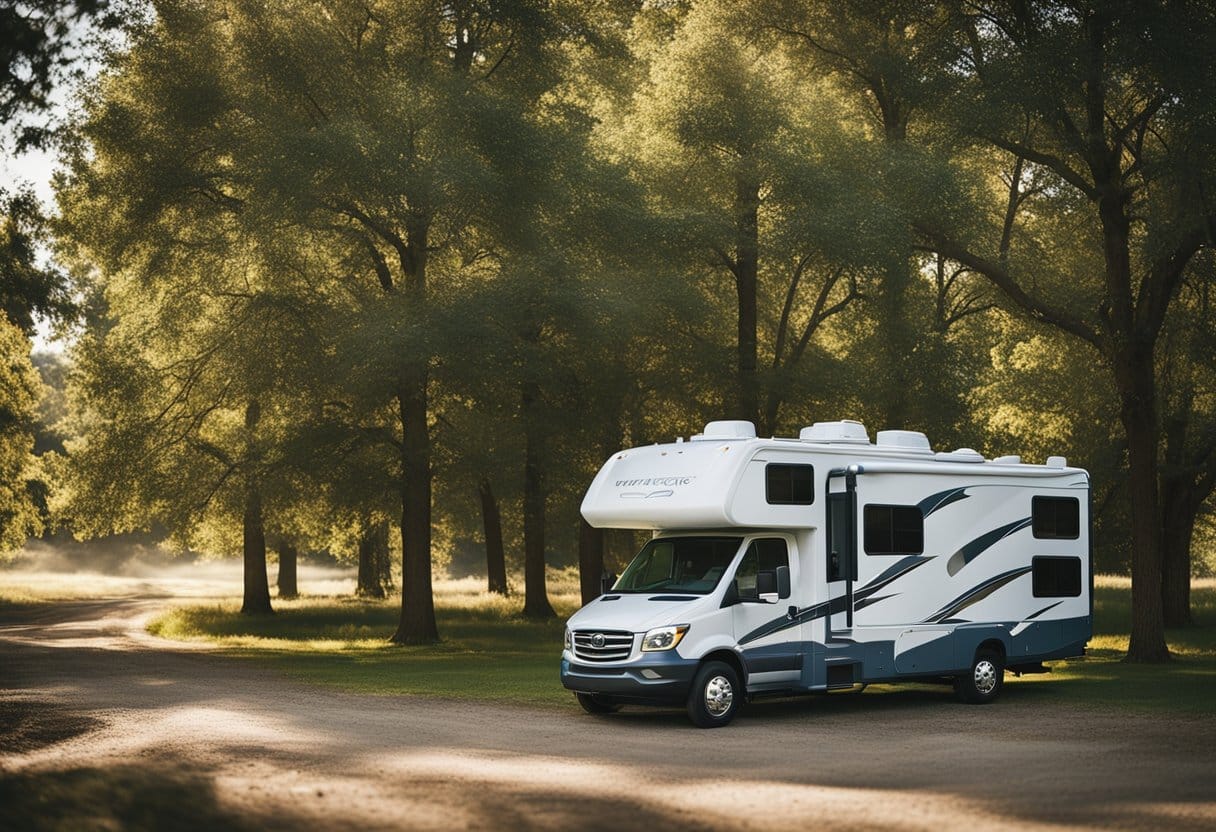
Before setting up a stationary RV home, it’s essential to comprehend the local regulations which can range from restrictions on the types of utilities you can connect to, to the necessity of moving your RV every few months. For those looking to put down roots without the constraints of a traditional home, investigating the zoning laws and local regulations is a necessary first step.
Registering an RV as a permanent dwelling often involves navigating bureaucracy: acquiring the right permits, ensuring your RV meets specific standards like being classified as an accessory dwelling unit, and staying compliant with regional requirements in mobile home parks.
Key Takeaways
- The legality of full-time RV living varies by state, with Texas, Florida, and Arizona among the most accommodating.
- Local zoning laws and regulations are crucial in determining the feasibility of living in an RV on your property.
- Establishing an RV as a permanent residence requires understanding and adhering to registration, zoning, and legal compliance.
Understanding RV Living Eligibility by State
Embracing the RV lifestyle full-time involves knowing the legalities involved, particularly when it comes to parking your home on wheels on private property. Different states have their own sets of rules and criteria that one must understand thoroughly.
Criteria for RV Living on Private Property
Each state has specific zoning laws and regulations defining acceptable RV living standards. These often include the designation of an RV either as a temporary structure or as an accessory dwelling unit (ADU).
Homeowners may need to prove that their RV meets certain safety and sanitation standards or secure permits that recognize the RV as a habitable structure. It’s crucial to check with local authorities since city laws can be more restrictive than state-level rules.
State-by-State Legal Overview
When it comes to rv living, states such as Texas and Florida are known for their welcoming stance, with many RV parks offering long-term residencies. States like Arizona, Nevada, and South Dakota also stand out for their RV-friendly regulations, allowing people to declare their RV as their primary residence. However, in states such as California and Oregon, individuals may face stringent local laws that limit the duration one can live in an RV, even on private property.
In Colorado and Washington State, long-term living in an RV on your own land is typically contingent on meeting specific requirements, often involving obtaining a conditional use permit. Montana tends to be more lenient in rural counties, but again, it’s essential to verify local regulations. Conversely, New York, Michigan, Massachusetts, and Kentucky have more restrictive policies, which can limit the ability to live in an RV full-time.
States like North Carolina, Pennsylvania, Arkansas, and others may have varying degrees of openness to RV living, with the common necessity of navigating a mix of mobile home parks regulations and zoning constraints. No matter where one hopes to park, doing one’s homework on state and local RV home laws is crucial for a smooth transition to living on the road.
Remember, this is just a brushstroke of the broad picture, and it is imperative for RV enthusiasts to delve into the particulars of their state’s stance on the matter for a lawful and hassle-free experience.
Zoning Laws and Local Regulations
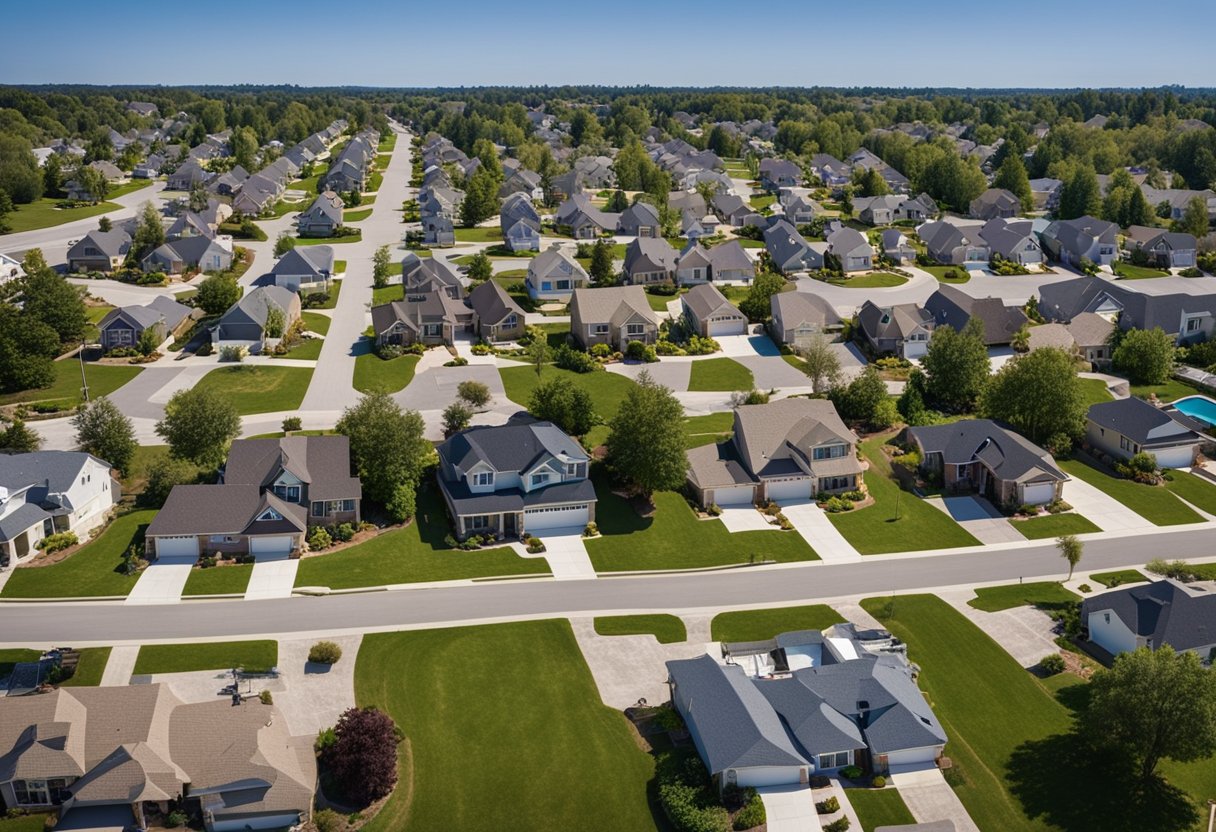
Understanding the patchwork of zoning laws and local regulations is crucial for anyone considering using their property for RV living full-time. These rules govern where you can situate an RV and how long you can live in it.
Impact of Local Ordinances on RV Living
Local ordinances can have a significant impact on RV living possibilities. Each city and county has its set of zoning laws, which can dictate whether you can park an RV on your property, let alone use it as a permanent residence. For instance, accessory dwelling unit regulations may allow an RV to be used as a secondary housing option on a property zoned for residential use, but some city laws may prohibit this use entirely.
- Arizona and Florida are often highlighted as more lenient; many of their localities accept RVs as long-term homes if certain conditions are met.
- Texas also favors RV homeownership, with numerous rv parks and communities designed for such a lifestyle.
Building codes can further stipulate safety standards that an RV must meet, distinguishing between recreational use and full-time living standards.
Navigating County Zoning and Property Restrictions
Understanding county regulations and covenants is another layer in ensuring compliance for RV home setup. Counties typically have jurisdiction outside city limits and may have different requirements that either align with or diverge from local city ordinances.
- In California, some counties permit RV living with the necessary permits and utility hookups, especially in rural areas.
- Oregon has varied regulations, with some counties being more accommodating for RV usage as full-time residences, provided they meet septic and electrical hookups guidelines.
Navigating the local regulations is a step-by-step process that generally involves:
- Checking the local zoning maps
- Reviewing any covenants in the property deed
- Understanding the neighborhood’s mobile home parks guidelines
Always engage with local planning departments directly for the most accurate and current information. They are the best resource to clarify what is allowed and what might require a special permit or variance. Remember that while some states have overarching state laws, the local level is where you’ll find the most specific and actionable rules for RV living.
Establishing a Permanent Residence in an RV
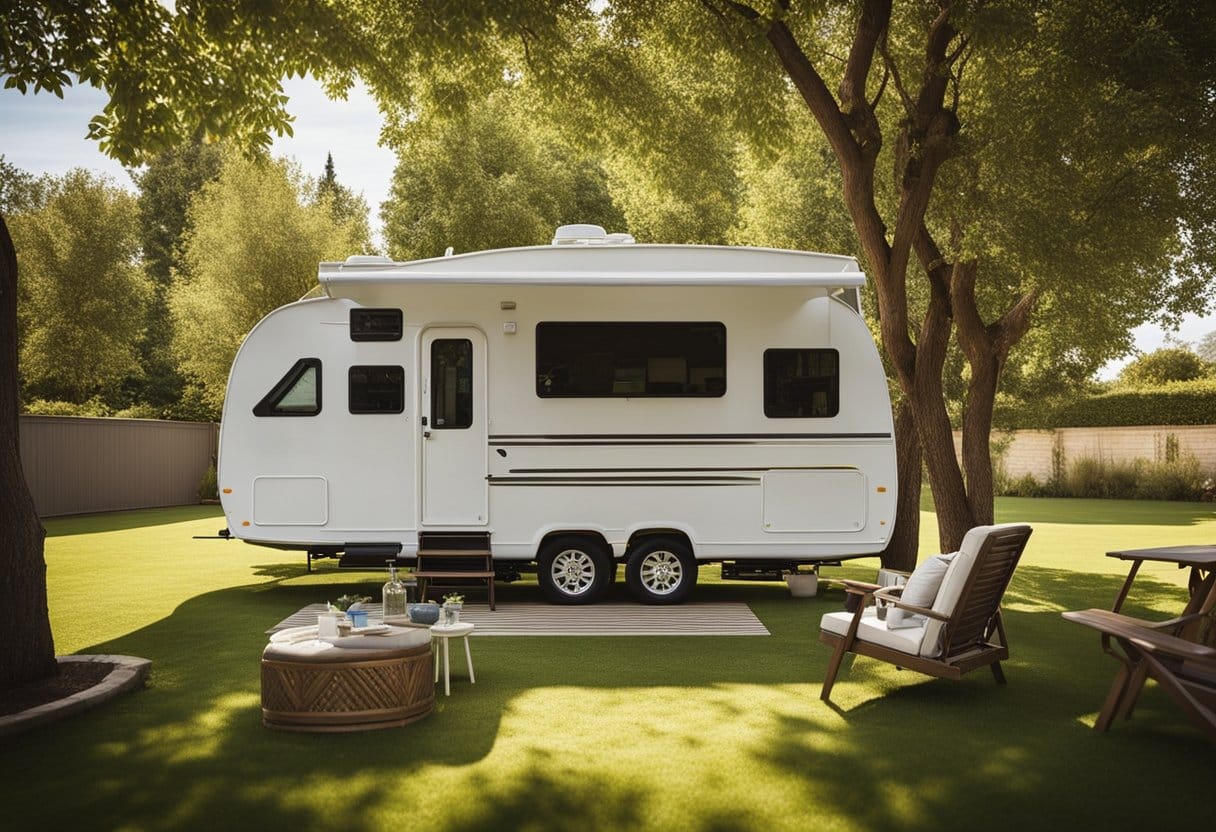
Living in an RV full-time is a lifestyle choice gaining popularity, but it does come with legalities and logistics that one must navigate. To establish an RV as a permanent residence, it is crucial to secure the right permits and comprehend the address and domicile requirements.
Securing the Right Permit
To legally live in an RV on your own property, you’ll likely need a specific permit; this can vary greatly by state and even local zoning laws. For example, some states permit living in an RV full-time on your own land, provided you are hooked up to utilities like electricity and water. In other locales, an RV is classified as an accessory dwelling unit (ADU), which comes with different restrictions.
Before setting up your RV home, check the city laws and determine whether your property is zoned for such use. Mobile home parks typically have the necessary zoning, but private land might need a residential or special use permit.
Address and Domicile Requirements
Choosing a domicile state is vital for rv living, as it affects everything from taxes to voting. Texas, Florida, and South Dakota, for instance, are popular domicile states for RVers due to favorable laws. In these states, you can establish a legal address for your RV through various services designed for those without a fixed residence.
The address is crucial for receiving mail, obtaining insurance, and registration. Additionally, you must be able to prove your intent to remain in the state and return after absences, which generally involves having some sort of physical tie to the state, such as a membership at an RV park.
Registration and Legal Compliance for RVs
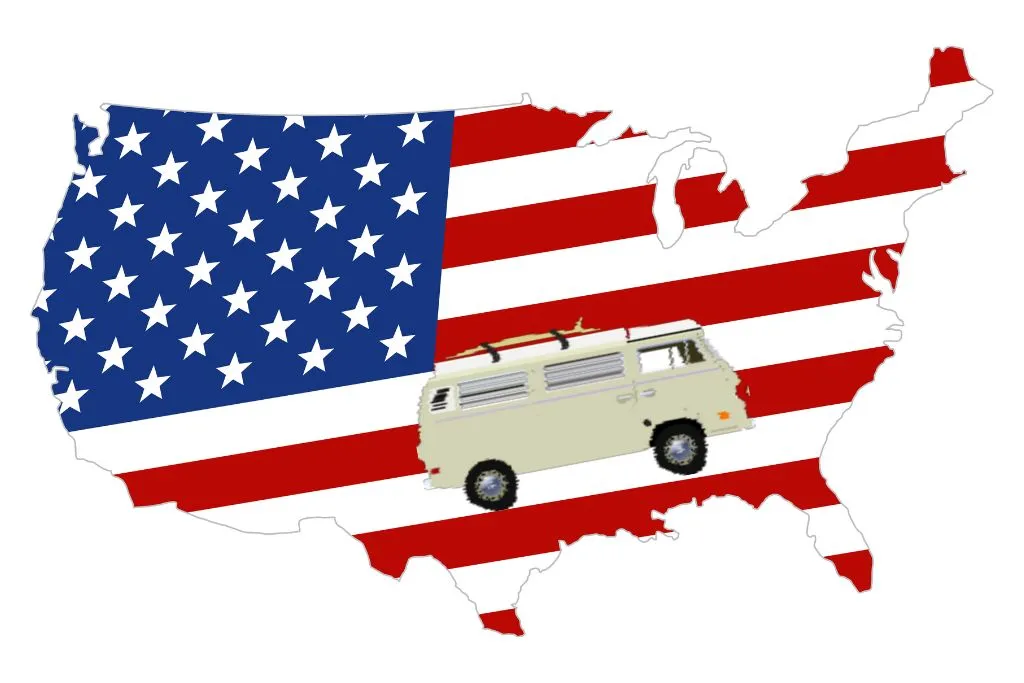
Living in an RV on one’s property is a lifestyle choice that’s subject to regulations varying by state. Ensuring that your recreational vehicle meets legal standards is crucial for a hassle-free experience.
Vehicle and Insurance Requirements
In the United States, all states require registration and insurance for RVs to be recognized as legal vehicles on the road. The types of registrations and the level of insurance coverage necessary can differ from one state to another. Typically, vehicle registrations need to be renewed annually or biennially. States such as Arizona, South Dakota, and Texas are popular for RV living due to their relatively straightforward registration processes and favorable zoning laws.
Insurance is just as important as registration; it should cover not only the vehicle itself but also liability in the case of accidents. Most states require a minimum amount of liability insurance. Full-time RVers might consider full-timer’s coverage, which is more comprehensive than standard insurance and resembles a homeowner’s policy.
Understanding State Tax Implications
Choosing to live in an RV home has implications on both income tax and property taxes. Several states with no state income tax, including Florida, Washington, and Nevada, are advantageous for those seeking a nomadic lifestyle. However, mobile home parks residents may still face local taxes.
Property taxes are less straightforward. An RV that qualifies as an accessory dwelling unit might be taxed differently than a standalone property. Some localities, even within states favorable to RV living, may have city laws that impose additional taxes or fees on vehicles used as full-time residences.
In summary, RVers need to navigate a patchwork of state and local regulations, including vehicle registration, maintaining proper insurance, and understanding tax obligations. States with favorable laws for full-time RV living range from the beaches of Florida to the wide-open spaces of Texas, each with their own requirements and benefits.
Connecting Utilities and Services for Long-Term Living
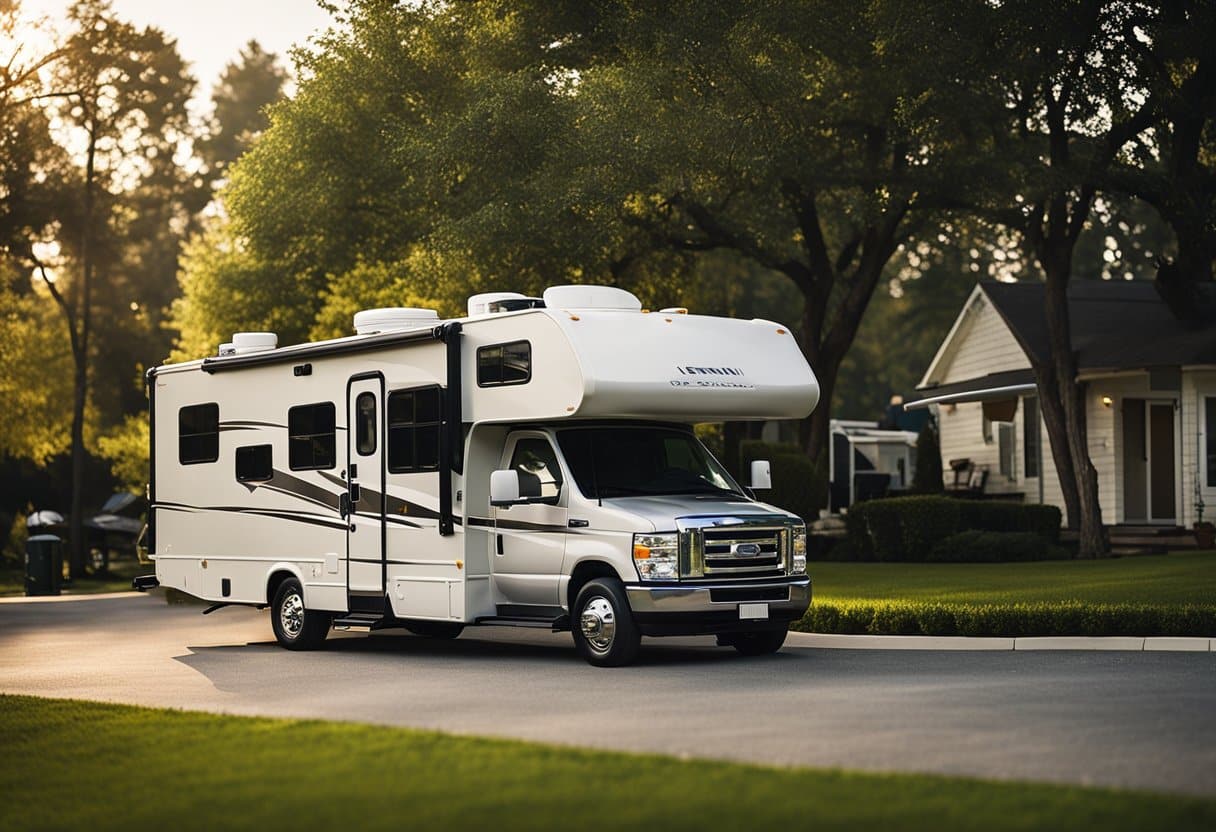
Setting up a permanent residence in an RV requires careful planning to secure access to essential utilities and manage waste effectively.
Integration of Essential Services
Connecting to electricity and water services is central to sustainable RV living. In many RV parks and regions where zoning laws allow the use of RVs as an accessory dwelling unit, hookups for power and water are already established.
For individuals setting up their RV home on private property, they’ll need to liaise with local utility companies to ensure a reliable and legal connection. Consultation with city laws is crucial, for uninterrupted access to utilities can dramatically influence comfort and livability.
Waste Management and Sanitation
The management of waste, particularly the installation of a septic system, plays a vital role in long-term RV habitation. Effective sanitation and waste management are non-negotiable components of a permanent setup.
In states that permit RVs as full-time dwellings, regulations surrounding the proper disposal systems must be adhered to. For instance, while mobile home parks often have communal waste processing services, a standalone property will typically require a personal septic system installation — an undertaking regulated by health department codes to ensure the prevention of environmental contamination and public health hazards.
Financial Considerations of RV Living
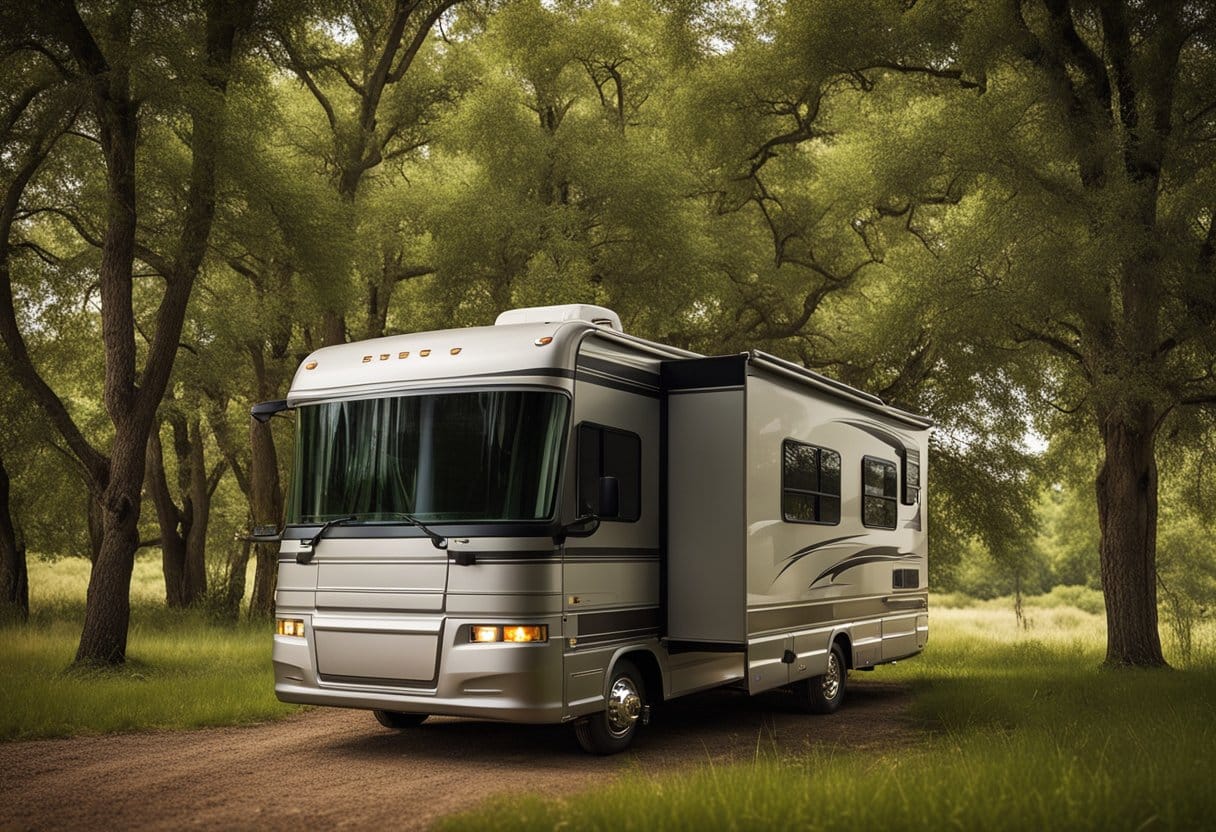
When opting for RV living, it’s crucial to analyze the costs and potential savings compared to traditional housing. Individuals must also prepare for the financial responsibility of maintaining their mobile home.
Cost-Benefit Analysis of RV Lifestyle
RV living can offer significant cost savings over traditional homes, largely due to reduced expenses on utilities, taxes, and the cost of the land.
In states like Texas, Arizona, Florida, and Nevada where zoning laws are favorable, homeowners can potentially live in an RV full-time on their property. Coupled with the ability to reside in RV parks or on private land as an accessory dwelling unit, the RV lifestyle allows for a level of flexibility that can be both financially efficient and beneficial.
However, this depends on one’s lifestyle and financial goals. The following states allow full-time RV living on private property, given certain conditions are met:
- Texas
- Arizona
- Florida
- Nevada
Other states may have more restrictive city laws or require RVs to be placed within designated mobile home parks. It’s important to research local regulations thoroughly.
Benefits:
- Lower utility costs
- No mortgage or rent (if RV is owned outright)
- Reduced property taxes
- Flexibility with location
Considerations:
- Initial RV purchase cost
- Site rental fees if not on owned property
- Variability by state and local zoning laws
Maintenance and Repair Expenses
Maintenance and repairs are an inevitable part of RV living, just as they are with traditional homes. However, the costs can vary dramatically. An RV’s upkeep includes regular servicing of its engine, generator, plumbing, and electrical systems.
Unexpected repairs can also arise and may be costly due to the specialized nature of RV components. Regular maintenance, such as roof sealing and winterizing, is essential to avoid larger repair bills down the line.
Examples of RV Maintenance Costs:
- Engine/Generator Service: $200-$300 annually
- Tire Replacement: $200-$300 per tire
- Roof Maintenance: $100-$200 per year
Residents must stay informed about the regulations of their state regarding RV home maintenance and whether they can perform it in RV parks or on their own property. By doing so, they can ensure their budget aligns with this lifestyle choice.
Lifestyle Adjustments for Full-Time RV Living
Embarking on a full-time RV living adventure means significant lifestyle changes, with careful planning needed to harmonize daily routines and embrace a life of flexibility and independence on the open road.
Designing Your Daily RV Life
Life in a Recreational Vehicle (RV) redefines living spaces, urging inhabitants to make practical arrangements regarding their kitchen, sleeping area, and toilet facilities. Cooking and eating becomes an exercise in efficiency, often requiring multipurpose tools and compact appliance usage.
Sleeping areas serve as retreats and sometimes double as workspaces. Staying in compliance with local zoning laws, which vary widely across states from California to Florida, can affect one’s ability to legally inhabit an RV as a full-time residence. Some opt for RV parks or mobile home parks, which are specifically zoned for RV living.
Embracing Flexibility and Independence
The foundation of RV lifestyle lies in its flexibility and independence, offering the allure of the open road and the freedom to explore long-term RV living across the United States. Staying informed about city laws and regulations regarding accessory dwelling units is crucial for anyone considering this lifestyle.
While some areas welcome full-timers with open arms, others restrict the usage to temporary escapes, often regulating the duration one can stay in an RV home. The RV industry supports this nomadic lifestyle by adapting to the needs of those who choose an RV for their full-time living quarters, ensuring a sustainable life on the move.
Navigating Homeowners Associations and Private Land Regulations
Living in an RV on your own property can be a liberating experience; however, understanding the overlay of homeowners associations (HOAs) and private land regulations is critical. HOAs particularly have rules that may impact RV living, even in states where it’s legal.
Zoning laws vary significantly from state to state and even city to city. They dictate whether you can park an RV or place a mobile home on your property. These laws also influence the provision for an accessory dwelling unit (ADU), which may offer an alternative living space on the same lot as a primary residence.
- RV Parks and Mobile Home Parks: Typically, these are more flexible environments for RV enthusiasts, as they cater specifically to this lifestyle.
- Private Land: When you own the land, local city laws will guide if and how you can legally live in an RV full-time.
Key terms to understand include:
- Accessory Dwelling Unit (ADU): A secondary house or apartment that shares the building lot of a larger, primary house.
- RV Home: RV set up for living on a property.
States allowing full-time RV living include, but are not limited to:
- Arizona: Known for its RV-friendly laws.
- Florida: Offers a variety of RV parks and lenient zoning laws.
- Texas: Particularly flexible with rural property regulations.
Before settling on your property, it’s essential to review the HOA covenants in your area, as these might have specific restrictions against RVs being used as permanent residences. They could limit the size, type, and timeframe for having an RV on your property.
When looking to establish an RV as a home, you must comply with sewer, electrical, and build quality standards. This ensures safety and compliance with zoning laws.
Remember, each location will have unique requirements and regulations. Engage with local planning officers and zoning boards to navigate the regulatory landscape of RV living.
Frequently Asked Questions
When considering living full-time in an RV, it’s essential to understand the specific zoning laws and regulations that apply to RV living on private property. Here are some of the most commonly asked questions about this lifestyle.
Is it permissible to permanently reside in a camper on my own land?
Yes, in some states, you can live permanently in a camper on your own land. However, this is subject to local zoning laws, which may require the property to have a designated accessory dwelling unit or other permanent structures.
What are the duration limits for inhabiting an RV on private property?
Duration limits for residing in an RV on private property vary by location. Some areas may have no restrictions, while others could limit stay to a few days unless the RV is parked in designated RV parks or mobile home parks.
What are the regulations regarding the use of campers as living quarters?
City laws establish the regulations for utilizing campers as living quarters, and these rules can differ significantly. They encompass various aspects, including utility connections, sanitation, and the required distance between the RV and other structures.
Which states are the most accommodating for full-time RV residency?
States such as Arizona, South Dakota, and Florida, with their flexible zoning laws, are known to be highly accommodating for full-time RV living. These states provide favorable conditions for individuals seeking to establish their RV as their primary domicile.
Under what circumstances can an RV be considered a primary domicile?
An RV can be considered a primary domicile if it is stationary and adheres to local zoning regulations. Some jurisdictions may also require the RV to have fixed utility connections and a certain level of structural anchoring.
Are there specific guidelines for parking an RV on my property for living purposes?
Yes, specific guidelines usually include compliance with city laws, maintaining a certain aesthetic standard, and ensuring the RV does not obstruct city services or neighboring properties. It’s crucial to check with local authorities to understand the applicable requirements.
Wrap up
Living in an RV is a way to minimize your living space and even cut your expenses while remaining true to a minimalist lifestyle. If you plan to live in an RV, you can also dress up the exterior of our RV just like you decorate your house. A more fun way to live like you’re living in a home. Some RVers also decorate the exterior of their RVs to keep track of where they’ve been, personalize slogans, celebrate holidays, etc.
RVers who cover their RVs in custom bumper stickers look cool and stylish, a unique way to express your opinions and preferences. However, if you’re looking to purchase land and live in an RV full-time, a few states stand out as more accommodating than others.
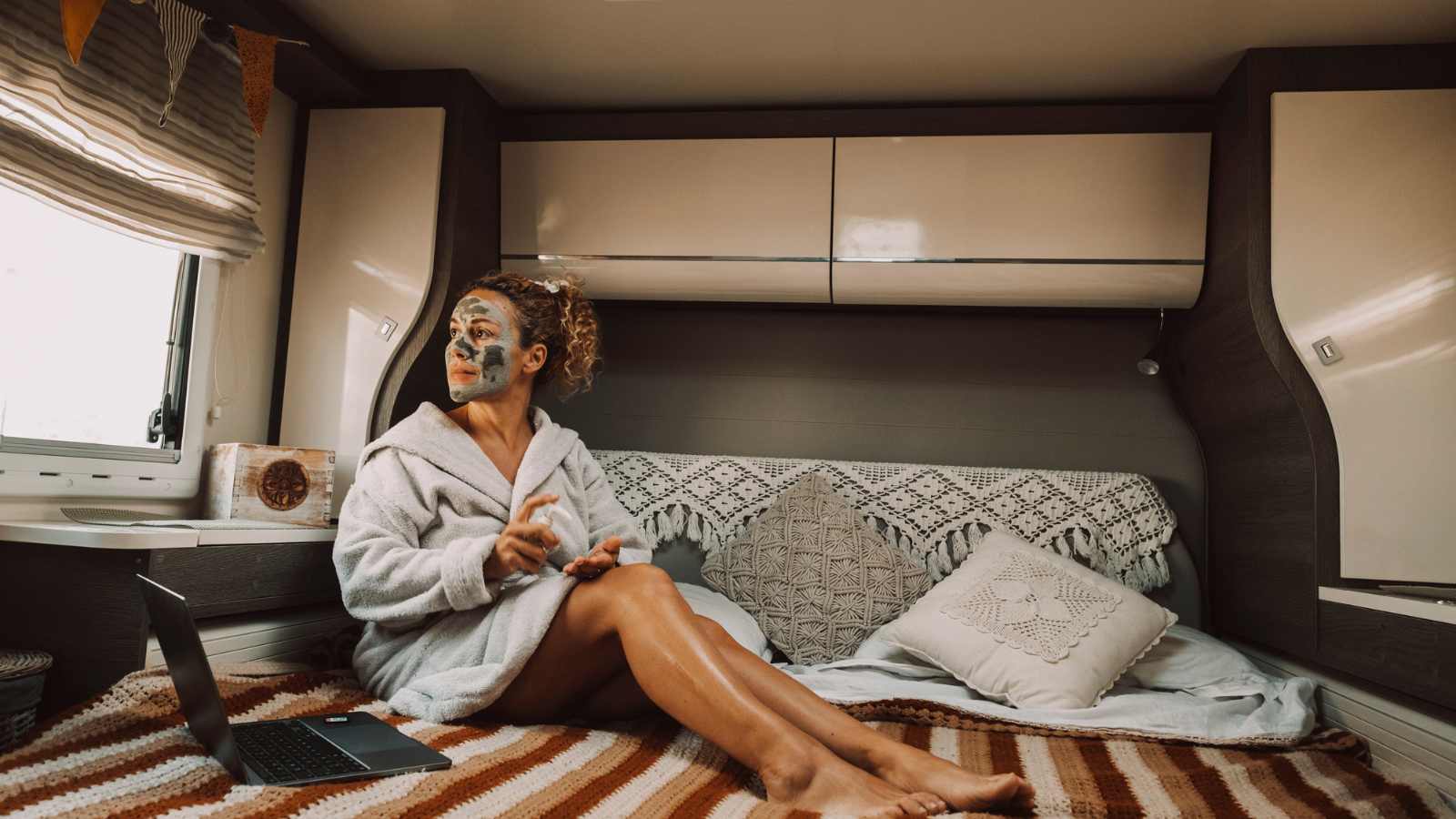

We’re finding UT very difficult to live full time in a RV here in FL. Everyone keeps telling us you’re allowed to live in it while you build a home. Is this what you are referring to because that is def not what we want. We own a nice RV and don’t want to have to buy or build a home just to live in it. Is there any other info you can tell me to help us. We live in pasco fl
Everyone has got this misconception that Florida is a giant free for all state with no laws or regulations to abide by. That is actually far from accurate. There are more laws and regulations in Florida than up north in liberal run states. And Florida is NOT a RV friendly state to live in your RV in private. I came here myself a few years back from up north thinking I would be able to breathe but nope. I’m looking forward to getting out of Florida soon and back to more of a people friendly state.
We need to challenge our constitutional right to live in the domicile of our choosing on private property that is our freedom of expression they’re are enough YouTubers that live the lifestyle to draw awareness to the issue
We are experiencing the same issue in Wakulla Co. FL.
I am also living in a nice 5th wheel in an RV Resort in Florida. Looking for land in the state to move the rv on but have only found one county thus far where its even possible. (Taylor)
There’s no periods or – marks. People who live in RVs and the government tells us we can’t stay here we can’t live here they just keep moving on you know I don’t think they realize what homeless means when when you’re homeless and you don’t have enough money to keep moving around the state trying to find a place to live so why don’t they pay us so we could go buy a house and we can have a home base what is the trick what’s the key what is it that they want it’s the people that own this planet not these that tell us where and when and how and you can’t live here and you must move on. What are you supposed to do you’re on a you’re on an income you only get so much a month you have enough money to put away to buy an RV because you need a place to put your butt get out of the rain get out of the shelter what are you supposed to do you know they have the words but they don’t have the words to help you so they tell you you can’t stay here you got to move on you got to move on move on to where the end of the planet where you supposed to go they don’t build us anywhere to go with the RVs they know we’re broke we’re homeless I mean look at these cities now look at all of them how they supposed to clean this up when they don’t even help us and we should have a place to put our bed and a place to have a shelter this is all a bunch of s*** and it needs to stop because there’s a lot of good people out there that want to have nice things in life and and have a bed and a shelter but we don’t have enough money we can’t afford to rent cuz it’s so God damn high there’s nothing left so why don’t you you know give us money more money to help us out so we can go out and buy a nice house and get off the street but in the meantime leave us alone because we’re trying to live like you and everybody else as long as you don’t trash where you live I think that’s the biggest part of it all people just trash right where they Park you know they don’t need to live like that I think if they cleaned up their mess they’d be welcome back but they keep selling these RVs and everywhere you go with them the fees are so expensive for the night where you supposed to do so I think the government needs to go out pick these people up give him some cash every month whether they deserved it earned it or not so they can have a shelter you know this is not a Nazi camp don’t treat us like a prisoner..
Couldn’t agree with you more. For one, many people live on the streets, due to government legislation allowing corporations to buy up neighborhoods, and charge high rents. And our healthcare? I have news for anyone who feels as though the people on welfare are our problem. The fact, is that 85% of people in America do NOT want to live on welfare. However they have to, simply because of the rising cost of food, housing and healthcare. These barbaric laws are tailored to put millions out on the streets. How dare these public officials tell us how to live a clean and simplified life style! I’ve been living a simple life for better than 40 years now. I’m healthier and out of debt, because I don’t buy their products, or believe their
corporate propaganda. If funding a 7 trillion dollar war in the Middle East, or funding a 160 billion plus war in Ukraine is patriotic, then we can all wave our flags underneath an overpass in SF or LA. The truth of the matter is, that simplified living affects their bottom line. I’m sure that anyone who wants to live a simple life in an RV, won’t be shitting or urinating in the streets, like many already do nationwide, as a result of our toxic congress.
James N.
10/22/2023 at 10:16 pm
Mr. Jeff and Mr. Campbell make some valid arguments. While I agree with most of what was said, I think it would be more appropriate and accurate to refer to the toxic Republican members of Congress. Democratic members, (including those Independents, like Bernie Sanders, who typically caucus with the Democrats), are usually making an earnest effort to uplift the nation, especially those of us who are at the mercy of the super-wealthy. As far as our aid to Ukraine, to do nothing would seem to acquiesce to tyrants like Putin. Meanwhile, we do have our own tyrants in local governments, who cannot grasp the most rudimentary ideals of American freedom. RV owners are inappropriately burdened with nonsensical and un-American strictures that defy basic constitutional rights. There is a prevailing attitude that big money usually gets more respect and more consideration when there are issues affecting property rights. The best way to defeat that paradigm is by organizing voter opposition, and supporting candidates who, like most Democratic Party candidates, will fight for those of us who are less prosperous but who deserve the same basic rights and privileges as any elitist. But that methodology requires time and work. We the People want our basic rights and sustenance, including shelter, NOW! Not in some promised future after we die. An RV is both a vehicle and a mobile residence. Local, state, and national laws need to fully support those facts without penalizing owners or renters unfairly nor indiscriminately. Where special needs exist, governments should provide. Governments should be prohibited from making onerous demands without providing the means to meet them. RV owners contribute to local economies and local communities and services. They should have the same rights and services as any homeowner, and at rates that allows for any lower income status, or other factors such as disabilities and age. (As far as the Middle East debacle, it was totally uncalled for. We will be carrying future costs that could exceed the $7 trillion already spent. For sake of comparison, $160 billion is 2.28 % of $7 trillion.) Why can’t RV owners and supporters unite in class action lawsuits against local, state, and federal laws that unfairly penalize RV owners and residents?
Thanks to Mr. Olu for his authorship of important and interesting topics.
Jeff I completely agree with you I just found out you can claim your RV as your permanent resident on your tax return but code enforcement tells us we can’t live in our mobile home on a private property yet we can claim it as our primary residence on our tax return there’s really some problems here. It’s all about the money they want us to pay taxes but they don’t want to help us out when we need a place to park it
North Carolina does not allow living in an RV as a permanent residence. We own an RV park and have had several calls from people who were living in their RV on their land while building their house. The County came in and told them they had to move to an RV park, but I imagine it was neighbors who reported it.